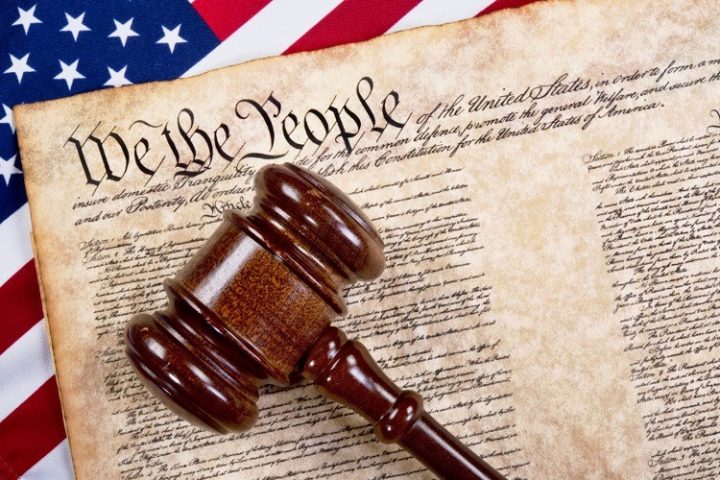
Soon, the U.S. Supreme Court will usurp the authority to redefine the Second Amendment … again.
Here’s a quick background on the case that will be heard by the Supreme Court this fall, as provided by Spectrum 1 out of New York:
Justices on the U.S. Supreme Court will hear arguments this fall to decide if a 1994 federal statute prohibiting anyone actively subject to a domestic violence restraining order from having firearms is constitutional. It comes after a Fifth U.S. Circuit Court of Appeals panel threw out the conviction of Texas man Zackey Rahimi, who was convicted of possessing firearms while under such a restraining order.
Judges cited last year’s Supreme Court ruling and decided though Rahimi discharged his weapon in public five times in two months while subject to the order, it did not invalidate his constitutional right to bear arms under the Second Amendment. The court argued no similar laws in U.S. history confiscated guns from people who were violent against their spouse or partner.
There is little question that a man was guilty of abusing his wife (assuming Rahimi was, for the sake of the discussion), and there should be no argument against punishing him for such a despicable act. The law not only does not protect such violence, but expressly forbids it. In fact, as a former practicing attorney, I can tell you from my own experience that state domestic-violence statutes often impose harsher sentences for people found guilty of harming a spouse than they do for the same act committed against anyone else (except a child). I have no disagreement with that disparity, and I doubt many others would, either.
That’s not the issue in this case, however, and it’s not the issue that the Supreme Court will give itself the authority to decide.
The issue in this case is whether a federal law prohibiting someone against whom there is a current domestic-violence restraining order from possessing a firearm violates the Second Amendment.
There are two big problems here, and one of them might surprise you.
First, the Second Amendment was added to the U.S. Constitution for the purpose of placing the right of the people to keep and bear arms beyond the reach of the federal government. Underlying that protection, of course, was the belief that when a government began to destroy the lives, liberty, and property of the people rather than to protect those things, it was the right of the people to answer force with force in order to restore the peaceful enjoyment of life, liberty, and property.
That said, however, the forceful altering or abolishing of tyrannical government is not at issue in this case, either.
The language of the Second Amendment does not set out any exceptions to the prohibition on government interference (infringement) with the right of all men to keep and bear arms. The unconscionability of a crime does not disqualify the criminal from keeping and bearing arms. Such an exception does not exist, and there would have been no Second Amendment had the first Congress attempted to carve out such an exception in the wording of the Second Amendment.
Now, as to the second big problem with the Supreme Court’s forthcoming consideration of this case is that the decision of the majority — which in a case concerning the Second Amendment is likely to be five judges — will be accepted by Americans of nearly every political stripe as “the law.” They will argue the merits and the meaning of the court’s decision. They will begin making plans to challenge or cheer the opinion. But, whether for or against the effect of the decision in the Rahimi case, they will accept it as law.
Even worse than the Supreme Court usurping the power to make law or the power to decide what the text of the Second Amendment means, is the fact that the supermajority of Americans will accede to that usurpation.
There is no tyranny without obedience to the tyrant. Now, the tyrant could use force to make us obey, but I doubt we’ll see John Roberts going door-to-door confiscating the weapons of people under current domestic-violence restraining orders. No, the power of this despotic decree will be ignorance.
Constitutional ignorance is much more powerful — and much more useful — than tyrannical force. The latter is bloody and the outcome unpredictable. The former is peaceful and is as reliable as the sun coming up in the East.
Consider this observation from the now-forgotten Dr. Richard Price, a Welsh preacher and friend of the Founding Fathers:
Give them just ideas of civil government, and let them know that it is an expedient for gaining protection against injury and defending their rights, and it will be impossible for them to submit to governments which, like most of those now in the world, are usurpations on the rights of men, and little better than contrivances for enabling the few to oppress the many.
Ignorance is the parent of bigotry, intolerance, persecution and slavery. Inform and instruct mankind; and these evils will be excluded.
The “evil” referred to by Dr. Price is submission to tyrannical government. And the “parent” of that evil is ignorance.
“If a nation expects to be ignorant and free, in a state of civilization, it expects what never was and never will be,” Thomas Jefferson wrote in a letter to Charles Yancey in 1816.
His best friend and fellow member of the Founding Fathers varsity squad, James Madison, likewise warned that liberty can only be assured by being informed:
“The advancement and diffusion of knowledge is the only guardian of true liberty.”
So, the problem isn’t that the Supreme Court will once again presume to declare the meaning of the Second Amendment. The problem isn’t that the Supreme Court isn’t granted that authority in the Constitution and the Constitution is the sole source of that body’s authority. The problem is that millions of Americans are ignorant of the actual text of the U.S. Constitution, of the meaning of that text, and of the intent of those who wrote and ratified the Second Amendment.
The good news, though, is that we can learn! We can teach ourselves (or be taught by others) the true meaning and intent of the text of the Constitution, and then we can teach those things to the next generation of Americans, who will then keep the federal beast safely secured by its constitutional chain.



